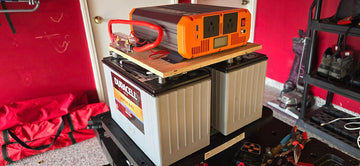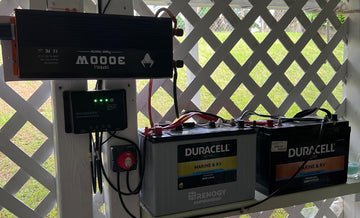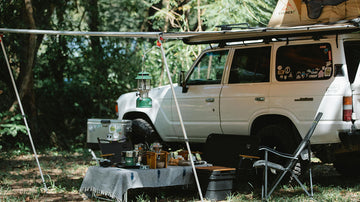Inverters play a vital role as one of the core components of a solar system. With 12V and 24V inverters on the market, homeowners are faced with the dilemma of choosing between them. This article will look at the differences between 12V and 24V inverters, comparing them in terms of output power, efficiency, ease of installation, and cost, to help you better understand the characteristics of both, and thus provide guidance and advice when choosing your solar system.
How the inverter works
An inverter is an electronic device primarily used to convert direct current (DC) power into alternating current (AC) power. Inverters are widely used in solar power systems, automotive electronics, UPS (uninterruptible power supply), and other areas. Here is how an inverter works:
- DC input: An inverter usually receives a DC input from a battery or other DC power source. The voltage of this DC input may be unstable, so the first task of the inverter is to convert this DC power source into a stable AC power source.
- Inversion process: Inverters contain electronic components inside, mainly transistors, capacitors, and diodes. These components work together to convert the incoming DC power into AC power through a series of switching operations.
- PWM control: Inverters typically use Pulse Width Modulation (PWM) control technology. This technique allows precise control of the amplitude and frequency of the output AC waveform by controlling the switching frequency and duty cycle of the switching elements.
- AC output: After the inversion process, the inverter produces an AC output similar to the mains. The voltage and frequency of this output are usually set to specific values to suit the needs of a particular application.
- Protection features: Inverters usually also include various protection features such as overload protection, short-circuit protection, overtemperature protection, etc. to ensure the safe operation of the inverter and connected equipment.
Differences between 12V and 24V inverters
Whether it's an off-grid system, a motorhome setup, or a backup power solution, you'll be faced with the choice between a 12-volt inverter and a 24-volt inverter. A key decision you will face is choosing between a 12V inverter and a 24V inverter. This choice will affect your power system's efficiency, performance, and overall functionality. So, it is important to understand the differences between these two conversion systems and determine which is better suited to your specific needs.
Efficiency
Inverter efficiency is a critical consideration when choosing between a 12V inverter and a 24V inverter. This efficiency determines how efficiently DC power is converted to AC power and has a direct impact on the performance and running costs of the overall system.
12V inverters are widely used in smaller installations, but due to their higher current requirements, there are efficiency challenges that can lead to greater energy losses as heat and voltage drops contribute to these losses. In contrast, 24V inverters typically have higher efficiencies, especially in larger systems, due to lower current requirements and reduced line losses.
This increased efficiency saves energy, extends battery life, and potentially reduces the size of system components. However, the choice between 12 and 24 volts is not always straightforward. Factors such as the size of the load, the quality of the inverter, and the specific power requirements all come into play. While 24V systems often offer better efficiency for larger installations, a 12V system may still be a suitable choice for smaller, lower-power applications.
Different batteries are suitable for different voltages. 12V inverters are suitable for 12V batteries, the system has greater compatibility with existing components and is easy to use. Often used for small installations such as caravans or simple off-grid cabins. Such systems typically have a low initial cost but may face efficiency challenges in larger installations.
On the other hand, 24V inverters are adapted to 24V batteries or two 12V batteries connected in series. 24V systems are even better in terms of efficiency and scalability and are particularly suitable for high power requirements and future expansion. Because they draw less current, 24V systems reduce heat and power loss through wiring. While individual 24V batteries may be more expensive, the overall system cost may be more affordable due to reduced wiring and the number of components that may be required. 24V systems typically perform better in high energy consumption situations and have higher charging efficiencies when used in conjunction with renewable energy sources.
Costs
Typically, 12Vs are less expensive to purchase. This makes them a popular choice for budget-conscious consumers. However, 24V systems can be more cost-effective in the long run, especially for larger installations.
24V inverters are more efficient, which typically reduces energy losses and lowers long-term operating costs. Because of the lower current requirements, 24V systems typically require thinner, less expensive wiring. For example, a 2400W inverter system requires 200A at 12V, but only 100A at 24V, significantly reducing wire size and cost. This difference becomes more pronounced in larger systems, highlighting the efficiency benefits of the 24V inverter.
Furthermore, as 24V systems become more economical for higher power applications, the cost difference will diminish. When deciding between a 12V or 24V inverter based on cost, you should also consider the power requirements of the actual application scenario.
12V vs 24V inverter: the applications
Different scenarios have different voltage and power requirements, the following are common applications for 12V and 24V inverters.
12V inverter:
- Small portable devices: 12V inverters are ideal for small portable solar devices used for camping, hiking, and off-grid power.
- Automotive and marine: 12V inverters are commonly used in cars, trucks, and marine systems to power devices such as engines, laptops, mobile phones, and small appliances.
- Emergency power: 12V inverters are useful during power outages to power lights, chargers, and low-power devices in car batteries.
- Wireless communications: A range of wireless communication devices such as wireless routers, wireless cameras, and more.
24V inverter:
- Off-grid solar systems: In contrast, 24V inverters are suitable for off-grid homes with high power requirements, efficiently powering refrigerators, air conditioners, and power tools.
- Remote telecommunications: In remote telecommunications towers, 24V inverters can work with radio equipment and surveillance systems.
- Industrial applications: Often used in industry to power large equipment and machinery, 24V inverters are popular for their high efficiency and scalability.
12V or 24V inverter: how to choose?
When choosing an inverter for your solar system, it is important to understand your energy requirements and load. For small systems, you should consider a 12V inverter, for medium systems a 24V inverter and large systems a 48V inverter. Higher voltages usually correspond to higher efficiencies and lower installation costs. Choosing the right voltage inverter is critical to optimizing the performance and cost-effectiveness of your solar system.
Key factors to consider
1️⃣System Size and Energy Requirements: Determine the power capacity of the inverter based on the size of the system and the energy output required. 12V inverters are suitable for small off-grid applications such as caravans and boats. 24V inverters are ideal for medium-sized systems, while 48V inverters are best suited for large residential or commercial installations with high energy requirements.
2️⃣Cost and Installation: Consider the initial purchase cost of the inverter, the running cost, and the installation cost. Higher voltage systems require thinner cables, reducing installation costs. While the initial cost of a 48V inverter may be higher, this can be offset by savings in cabling and installation costs.
3️⃣System Efficiency: The efficiency of the inverter is critical to the overall performance of the solar system. Higher-efficiency inverters maximize the conversion of solar energy and reduce energy losses.
4️⃣Types of inverters: Pure sine wave inverters provide high-quality AC power and are suitable for appliances with high power quality requirements. Modified sine wave inverters are suitable for general use.
FAQ
Q: Can I use a 12V inverter with 24V solar panels?
A: The use of a 12V inverter with 24V batteries and solar panels is not recommended as it may damage the inverter and the connected equipment. To ensure proper operation and safety of the system, it is best to select an inverter that matches the output voltage of the solar panels.
Q: How many solar panels do I need for a 24V inverter?
A: The power of the system design, the power rating of the inverter, and the rated voltage and power of the solar panels must be taken into account. Assuming your 24V inverter is rated at 3000W and each solar panel is rated at 250W, calculate the number of solar panels required: 3000W/300W = 12
Q: Is higher voltage better for solar systems?
A: While higher voltages offer advantages in terms of energy efficiency and reduced power loss in electrical systems, determining the optimal voltage for a solar system requires a careful balance of factors. Higher voltage does not necessarily mean 'higher is better', and the relationship between voltage and power is a delicate one, so several issues need to be considered to design a well-designed and cost-effective solar installation.
Q: Can a 24V inverter be connected to a 12V battery?
A: A 24V inverter should be connected to a battery system with a 24V output voltage to ensure a match. If you have a set of 12V solar cells that you want to connect to a 24V inverter, you could consider connecting them in series. By connecting two 12V batteries in series, you can stack their voltages to achieve a 24V output.
Q: How many batteries can be connected to the 24V inverter?
A: The number of batteries that can be connected to the 24V inverter depends on the ampere-hour (Ah) capacity of the batteries and the power rating of the inverter.

















